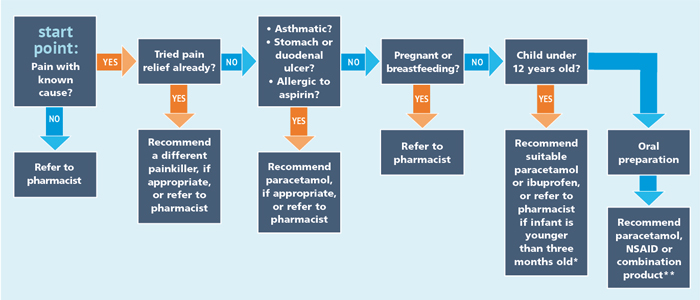10-minute clinic: pain relief
In OTC
Follow this topic
Bookmark
Record learning outcomes
This handy 10-minute clinic is designed to act as a quick reference guide that will help you when advising customers in different category areas. The flowchart leads you through the decision-making process to help you respond to customer queries. This month, we look at the advice you can offer and the products you can recommend to customers suffering from different types of pain

At a glance

*Unless aged over two months, weighs over 4kg and is not premature for post-immunisation fever, in which case, recommend a suitable product.
**Aspirin is suitable for those aged 16 years or over; naproxen for those between 15 and 50 years of age; combination analgesics for those over 18 years of age.
Whenever you talk to any customer, remember WWHAM:
Who is it for?
Remember, it might not be the customer who needs the treatment. Products containing aspirin, naproxen or codeine can only be recommended to certain age groups.
What are the symptoms?
Ask the customer to describe the type of pain they have and point out where it is hurting. The painkiller recommended may depend on the type of pain (e.g. an NSAID if there is inflammation).
How long have the symptoms been present?
This will help to establish whether the pain is acute or chronic.
Action already taken?
This will help to establish what they have already tried so that you can recommend a different active ingredient or format, if appropriate.
Medication?
Refer customers to the pharmacist if they are taking any other medication or have a medical condition.
You don’t have to ask these questions in order, and a customer might give you some of this information without you asking. As long as you get them into the conversation, you should be able to find out the information you need in order to make a recommendation. The golden rule to remember is: if in doubt, refer to the pharmacist. Don’t be embarrassed to ask for their advice.
When to refer to the pharmacist
• Any customer who requests an NSAID and has or has had a medical condition such as asthma, diabetes, high cholesterol, high blood pressure, a stroke, heart, liver, kidney, bowel or stomach problems, or is a smoker
• If there is persistent pain that is not relieved by over-the-counter painkillers
• Anyone buying large quantities of analgesics on a regular basis
• Pregnant or breastfeeding women
• Anyone under the age of 18 who requests combination painkillers
• Any customer taking other medicines.
Self care tips
- Locate the source of the pain and treat any underlying problems
- Muscle and joint pain can be relieved by rubbing or applying a hot or cold compress
- A hot bath or compress may ease backache and period pain
- Everyday activities such as walking and swimming can help to ease pain if they are introduced gradually
- During intense pain, deep breathing can help to relax muscle tension and ease any anxiety
- Sleep deprivation can worsen pain, so keep to a regular sleep routine.
Signposting
• British Pain Society
• Pain Relief Foundation
• NHS Live Well With Pain.
